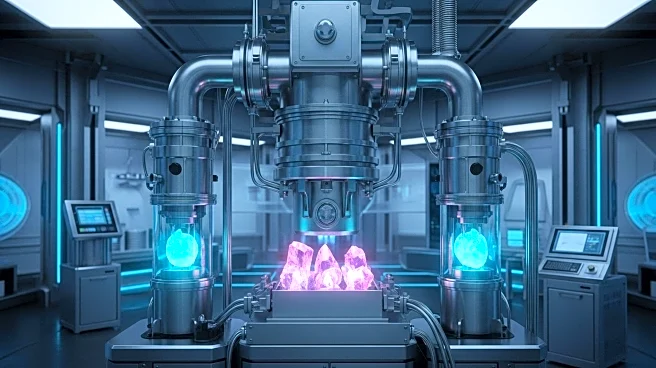What's Happening?
ABx Group, an Australian company specializing in rare earths, bauxite, and technology-driven mineral development, has achieved a significant milestone in its rare earths division. The company, led by Managing Director Dr. Mark Cooksey, has successfully completed impurity removal testwork, achieving less than 2% rare earth loss. This development is part of ABx's efforts to produce a mixed rare earth carbonate (MREC) in collaboration with the Australian Nuclear Science and Technology Organisation (ANSTO). The test results confirm ABx's high recovery potential from its Deep Leads deposit in Tasmania, which is rich in dysprosium and terbium. The next phase involves ANSTO preparing to produce the first MREC sample by the fourth quarter of 2025.
Why It's Important?
The successful impurity removal and high recovery potential from the Deep Leads deposit mark a crucial step for ABx Group in the rare earths sector. Rare earth elements like dysprosium and terbium are essential for various high-tech applications, including electronics, renewable energy technologies, and defense systems. The advancement in ABx's project could enhance the supply chain for these critical materials, potentially reducing reliance on imports and strengthening domestic production capabilities. This development is significant for industries that depend on rare earths, as it may lead to more stable and sustainable sourcing options.
What's Next?
As ANSTO prepares to produce the first MREC sample, ABx Group is poised to further its partnership and development efforts. The successful production of MREC will likely attract attention from industries reliant on rare earths, potentially leading to new partnerships or investments. Stakeholders in the technology and defense sectors may closely monitor these developments, given the strategic importance of rare earths. The progress in ABx's project could also influence policy discussions around resource security and domestic production incentives.
Beyond the Headlines
The advancement in ABx's rare earths project highlights broader implications for environmental sustainability and technological innovation. The ability to efficiently recover rare earths with minimal loss could set new standards for resource extraction and processing, promoting more environmentally friendly practices. Additionally, the focus on dysprosium and terbium, elements crucial for green technologies, aligns with global efforts to transition to cleaner energy solutions. This development may also spur further research and innovation in rare earth processing techniques.










